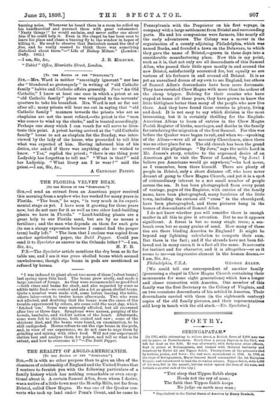THE REALITY OF ANGLO-AMERICANISM. [To THE EDITOR OP THE "SPECTATOR. "]
SIR, It is with no other purpose than to give an idea of the closeness of relationship of England and the United States that I venture to furnish you with the following particulars of a family history which has nothing remarkable or even excep• tional about it. A certain Samuel Alien, from whom I derive, was a native of a little town near the Mendip Hills, not far from Bristol, called Chew Magna. He was one of the Quaker con- verts who took up land under Penn's Grant, and he came to Pennsylvania with the Proprietor on his first voyage, ia company with a large settlement from Bristol and surrounding parts. He and his companions were farmers, like nearly all the early adventurers. The Colony was a mover in the organisation of a county adjoining Philadelphia, which was named Backs, and founded a town on the Delaware, to which they gave the name of Bristol,—grown in these days into a considerable manufacturing place. Now this is my point, such as it is, that not only are all descendants of this Samuel Allen, who passed their little span mostly in and around the new Bristol, satisfactorily accounted for, but equally so are various of his forbears in and around old Bristol. It is as yet an unrealised dream of my own to see England, but others of Samuel Allen's descendants have been more fortunate. They have ravished Chew Magna with more than the ardour of the cheap tripper. Delving for their cousins who have stayed at home all these years, they have grown to know the little birthplace better than many of the people who now live there. And they have found these cousins in plenty, living and dead. It is not easy to say which division is the most interesting, but it is certainly thrilling for the English- American Aliens to learn of entries in the Chew Magna. Parish Register of births, marriages, and deaths in the family far antedating the migration of the first Samuel. For this was before the Quaker wave began to roll, and when we—speaking of the Aliens—were all of necessity Churchmen, since there was no other place for us. The old church has been the grand centre of this pilgrimage. " By Jove," says the noble Lord in Mr. James's story, relative to the expressed desire of an American girl to visit the Tower of London, " by Jove ! I believe you Americans would go anywhere,"—he had never, as I remember, been there himself. There are plenty of people in Bristol, only a short distance off, who have never dreamt of going to Chew Magna Church, and yet it is a spot of extraordinary interest to a not small number of people across the sea. It has been photographed from every point of vantage, pages of the Register, with entries of the family name, have been photographed, many localities of the little town, including the curious old " cross " in the churchyard, have been photographed, and these pictures bang in the homes of descendants of Samuel Allen.
I do not know whether you will consider there is enough matter in all this to give it attention. But to me it appears significant. A forest is but so many single trees; a sea- beach even but so many grains of sand. How many of these ties are there binding America to England ? It might be beyond any lightning calculation to compute their sum. But there is the fact ; and if the strands have not been fol- lowed out in many cases, it is a fact all the same. It accounts for instinct and for character, and it is altogether—or so it seems to me—an impressive element in the human drama.— I am, Sir, &c., [We could tell our correspondent of another family (possessing a chapel in Chew Magna Church containing their monuments for some eight generations) which has a longer and closer connection with America. One member of this family was the first Secretary to the Colony of Virginia, and on two occasions descendants of his settled in America. Their descendants carried with them (in the eighteenth century) copies of the old family pictures, and their representatives still keep in touch with the old stock.—En. Spectator.]


















































 Previous page
Previous page